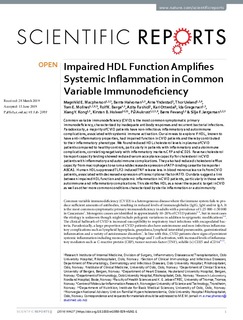| dc.contributor.author | Macpherson, Magnhild Eide | |
| dc.contributor.author | Halvorsen, Bente | |
| dc.contributor.author | Yndestad, Arne | |
| dc.contributor.author | Ueland, Thor | |
| dc.contributor.author | Mollnes, Tom Eirik | |
| dc.contributor.author | Berge, Rolf Kristian | |
| dc.contributor.author | Rashidi, Azita | |
| dc.contributor.author | Otterdal, Kari | |
| dc.contributor.author | Gregersen, Ida | |
| dc.contributor.author | Kong, Xiang Yi | |
| dc.contributor.author | Holven, Kirsten Bjørklund | |
| dc.contributor.author | Aukrust, Pål | |
| dc.contributor.author | Fevang, Børre | |
| dc.contributor.author | Jørgensen, Silje Fjellgård | |
| dc.date.accessioned | 2019-09-17T06:50:19Z | |
| dc.date.available | 2019-09-17T06:50:19Z | |
| dc.date.created | 2019-09-04T13:15:42Z | |
| dc.date.issued | 2019 | |
| dc.identifier.citation | Scientific Reports. 2019, 9:9427 1-10. | nb_NO |
| dc.identifier.issn | 2045-2322 | |
| dc.identifier.uri | http://hdl.handle.net/11250/2617088 | |
| dc.description.abstract | Common variable immunodeficiency (CVID) is the most common symptomatic primary immunodeficiency, characterized by inadequate antibody responses and recurrent bacterial infections. Paradoxically, a majority of CVID patients have non-infectious inflammatory and autoimmune complications, associated with systemic immune activation. Our aim was to explore if HDL, known to have anti-inflammatory properties, had impaired function in CVID patients and thereby contributed to their inflammatory phenotype. We found reduced HDL cholesterol levels in plasma of CVID patients compared to healthy controls, particularly in patients with inflammatory and autoimmune complications, correlating negatively with inflammatory markers CRP and sCD25. Reverse cholesterol transport capacity testing showed reduced serum acceptance capacity for cholesterol in CVID patients with inflammatory and autoimmune complications. They also had reduced cholesterol efflux capacity from macrophages to serum and decreased expression of ATP-binding cassette transporter ABCA1. Human HDL suppressed TLR2-induced TNF release less in blood mononuclear cells from CVID patients, associated with decreased expression of transcriptional factor ATF3. Our data suggest a link between impaired HDL function and systemic inflammation in CVID patients, particularly in those with autoimmune and inflammatory complications. This identifies HDL as a novel therapeutic target in CVID as well as other more common conditions characterized by sterile inflammation or autoimmunity. | nb_NO |
| dc.language.iso | eng | nb_NO |
| dc.publisher | Nature Research | nb_NO |
| dc.rights | Navngivelse 4.0 Internasjonal | * |
| dc.rights.uri | http://creativecommons.org/licenses/by/4.0/deed.no | * |
| dc.title | Impaired HDL function amplifies systemic inflammation in common variable immunodeficiency | nb_NO |
| dc.type | Journal article | nb_NO |
| dc.type | Peer reviewed | nb_NO |
| dc.description.version | publishedVersion | nb_NO |
| dc.source.pagenumber | 1-10 | nb_NO |
| dc.source.volume | 9:9427 | nb_NO |
| dc.source.journal | Scientific Reports | nb_NO |
| dc.identifier.doi | 10.1038/s41598-019-45861-1 | |
| dc.identifier.cristin | 1721488 | |
| dc.description.localcode | Open Access This article is licensed under a Creative Commons Attribution 4.0 International License, which permits use, sharing, adaptation, distribution and reproduction in any medium or format, as long as you give appropriate credit to the original author(s) and the source, provide a link to the Creative Commons license, and indicate if changes were made. | nb_NO |
| cristin.unitcode | 194,65,15,0 | |
| cristin.unitname | Institutt for klinisk og molekylær medisin | |
| cristin.ispublished | true | |
| cristin.fulltext | original | |
| cristin.qualitycode | 1 | |

